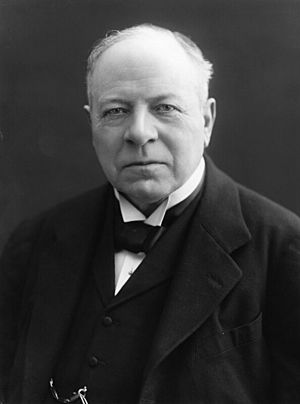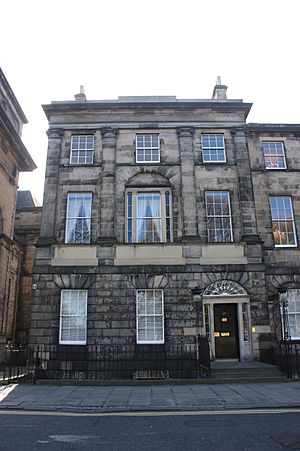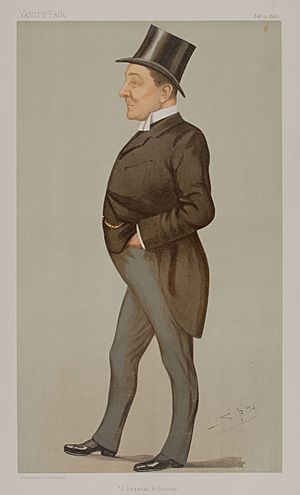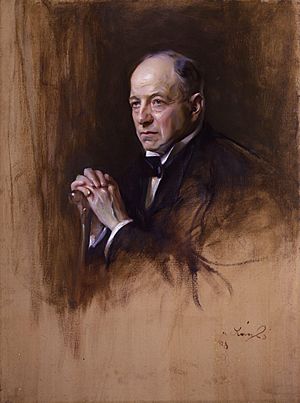Richard Haldane, 1st Viscount Haldane facts for kids
Quick facts for kids
The Viscount Haldane
|
|
|---|---|
 |
|
| Leader of the House of Lords | |
| In office 22 January 1924 – 3 November 1924 |
|
| Prime Minister | Ramsay MacDonald |
| Preceded by | The Marquess Curzon of Kedleston |
| Succeeded by | The Marquess Curzon of Kedleston |
| Lord High Chancellor of Great Britain | |
| In office 22 January 1924 – 6 November 1924 |
|
| Prime Minister | Ramsay MacDonald |
| Preceded by | The Viscount Cave |
| Succeeded by | The Viscount Cave |
| In office 10 June 1912 – 25 May 1915 |
|
| Prime Minister | H. H. Asquith |
| Preceded by | The Earl Loreburn |
| Succeeded by | The Lord Buckmaster |
| Secretary of State for War | |
| In office 10 December 1905 – 12 June 1912 |
|
| Prime Minister | Sir Henry Campbell-Bannerman H. H. Asquith |
| Preceded by | H. O. Arnold-Forster |
| Succeeded by | Colonel J.E.B. Seely |
| Member of the House of Lords | |
| Hereditary peerage 27 March 1911 – 19 August 1928 |
|
| Member of Parliament for Haddingtonshire |
|
| In office 18 December 1885 – 27 March 1911 |
|
| Preceded by | Hugo Charteris |
| Succeeded by | John Hope |
| Personal details | |
| Born | 30 July 1856 Edinburgh, Scotland |
| Died | 19 August 1928 (aged 72) Auchterarder, Scotland |
| Nationality | British |
| Political party | Liberal (1879–1923) Labour (1923–1928) |
| Education | University of Göttingen University of Edinburgh |
| Profession | Barrister |
Richard Burdon Haldane, 1st Viscount Haldane (born July 30, 1856 – died August 19, 1928), was an important British lawyer and thinker. He was also a powerful politician, first with the Liberal Party and later with the Labour Party.
He served as Secretary of State for War from 1905 to 1912. During this time, he made big changes to the British Army, known as the "Haldane Reforms". He was very interested in German ideas and tried to improve relations with Germany in 1912 through the Haldane Mission. However, this mission did not succeed.
In 1911, he became Viscount Haldane. He was also the Lord Chancellor from 1912 to 1915. He had to leave this job because some people wrongly thought he supported Germany. Later, he joined the Labour Party and became Lord Chancellor again in 1924. Besides politics, Haldane was a respected writer on philosophy.
Contents
Early Life and Education
Richard Haldane was born in Edinburgh, Scotland, at 17 Charlotte Square. His father was Robert Haldane. He came from a family with several notable members, including his brother John Scott Haldane, a famous scientist.
He went to school at the Edinburgh Academy. He then studied at the University of Göttingen in Germany and the University of Edinburgh. At Edinburgh, he earned top honors in Philosophy.
After studying law in London, he became a lawyer in 1879. He was very successful, specializing in complex legal cases. By 1890, he became a Queen's Counsel, which is a senior lawyer.
Haldane was known as a "philosopher-politician" because he was a deep thinker. His time in Germany made him very interested in German philosophers like Schopenhauer and Hegel.
Starting His Political Journey
Haldane was encouraged to enter politics by his cousin, Lord Camperdown. He joined the Liberal Party. In 1885, he was elected as a Member of Parliament (MP) for Haddingtonshire. He held this seat until 1911.
He wrote articles for a magazine called Contemporary Review. In these articles, he shared his ideas about "New Liberalism," which was a more modern way of thinking for the Liberal Party. Haldane was part of the "Liberal Imperialist" group within the party. This group believed in a strong British Empire.
In 1902, Haldane became a member of the Privy Council. This is a group of advisors to the King.
Becoming Secretary of State for War
In December 1905, Haldane was appointed Secretary of State for War. This was a very important job. He was responsible for the British Army.
Even though the government wanted to save money, Haldane made many important changes to the Army. His goal was to get the army ready for a possible war in Europe. He created the British Expeditionary Force. This was a group of six infantry divisions and one cavalry division ready to be sent overseas quickly.
Historians later said that the Expeditionary Force of 1914 was the "best trained, best organised and best equipped British Army ever to leave these shores."
Haldane's Army Reforms
Haldane's reforms were very important for preparing Britain for war. He set up the Imperial General Staff, which helped plan military strategies. He also created the Territorial Force, which was a volunteer army for defense at home. This force had 14 divisions.
He also started the Officer Training Corps to train future army officers. These changes helped make the British Army much more efficient. They allowed Britain to send about 120,000 soldiers to France in just 15 days in August 1914.
Haldane also helped create the Advisory Committee for Aeronautics in 1909. This committee supported the early development of aircraft in the United Kingdom.
A Philosopher in Politics
Haldane used his intelligence to help the government. He was a strong supporter of David Lloyd George's "People's Budget". This budget aimed to raise money for social programs.
During a big political crisis between 1909 and 1911, Haldane advised his friend, Prime Minister H. H. Asquith. He helped Asquith with legal advice during arguments with the King.
In 1911, Haldane was made a peer, becoming Viscount Haldane. He then became the leader of the government's business in the House of Lords. In 1912, he became Lord Chancellor, the highest legal officer in the government.
The Haldane Mission to Germany (1912)
In 1912, Haldane went on a special trip to Berlin, Germany. This was called the Haldane Mission. Its goal was to reduce the tension between Britain and Germany. Both countries were building many warships, leading to an arms race.
The mission was not successful. Germany would only slow down its warship building if Britain promised to stay neutral if Germany went to war. Germany especially wanted Britain to stay out of a war between Germany and France. Britain could not agree to this, as it would risk Germany taking control of Europe.
World War I and Later Years
When World War I began in August 1914, Haldane was one of the first government members to realize that war with Germany was unavoidable. He helped convince Prime Minister Asquith to prepare the army.
However, after the war started, Haldane was wrongly accused of being too friendly with Germany. This was partly because he spoke German fluently and had tried to make peace. A newspaper called the Daily Express spread these false accusations.
In May 1915, the Liberal government had to form a coalition with the Conservatives. The Conservatives insisted that Haldane be removed from his job. Even his close friends, like Prime Minister Asquith, did not strongly defend him. This was a difficult time for Haldane.
After leaving the government, Haldane became closer to the Labour Party. He believed in finding peaceful solutions, even during the Irish War of Independence in 1919.
His Work in Canadian Law
As Lord Chancellor, Haldane was part of the Judicial Committee of the Privy Council. This court made final decisions for the British Empire, including Canada. He heard many cases about how power was divided between Canada's federal and provincial governments.
Haldane often made decisions that gave more power to the provinces. Some Canadian lawyers and academics criticized this, saying it made it harder for the federal government to deal with big economic issues.
Impact on Education
Haldane believed strongly in the power of education. In 1895, he helped start the London School of Economics. He also helped create the London University Act in 1898, which improved London's universities.
He was involved in founding Imperial College in 1907. There is even a library named after him at Imperial College London. Haldane was also the second Chancellor of the University of Bristol and later the Chancellor of the University of St Andrews. He gave many important speeches about education.
His Writings
Haldane was a skilled writer and philosopher. He helped translate the first English version of Schopenhauer's book, The World as Will and Representation.
He also wrote his own philosophical books, like The Reign of Relativity (1921). This book explored the ideas behind Einstein's theory of relativity. He also published some of his public speeches.
Personal Life
Haldane had health problems throughout his life, including rheumatism and eye issues. He was a lifelong walker and enjoyed cigars.
He never married. He died suddenly from heart disease at his home in Auchterarder, Scotland, on August 19, 1928, at the age of 72. Since he had no children, his title of Viscount ended when he died.
Legacy
After Haldane's death, The Times newspaper described him as one of the smartest and most knowledgeable people to ever serve his country.
Military historians have praised Haldane's work as Secretary of State for War. They say he was very talented and intelligent. His reforms were crucial in preparing Britain for World War I.
See also
 | Claudette Colvin |
 | Myrlie Evers-Williams |
 | Alberta Odell Jones |




